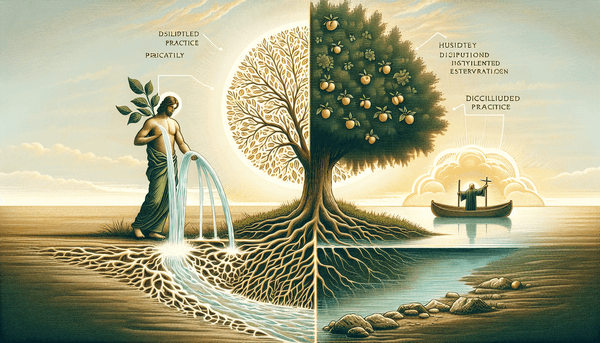Baptism with the Holy Spirit and Fire
When John the Baptist proclaimed that Jesus would 'baptize with the Holy Spirit and fire' (Matthew 3:11), he was heralding a transformative and purifying work that would be central to the Christian experience. This baptism signifies not just a cleansing, but an empowering presence, as depicted in Acts 2:3-4 during Pentecost, where the Holy Spirit descended like tongues of fire. The fire symbolizes the refining process a believer undergoes, burning away chaff, and leaving behind what is pure, as described in 1 Corinthians 3:13-15, ensuring that our works can withstand the test of fire.
Sanctification: The Process of Being Set Apart
Sanctification is the process by which a believer is set apart and made holy, a critical aspect of Christian living. This work of the Holy Spirit involves conforming to the image of Christ and living a life pleasing to God (1 Thessalonians 4:3). Sanctification is not a passive state but an active pursuit of holiness, involving the believer's cooperation with the Holy Spirit. Just as the Spirit transforms us into the image with ever-increasing glory (2 Corinthians 3:18), we too must yield to the Spirit's direction and discipline in our lives.
Jesus's Baptism and Ministry
The baptism of Jesus is a profound event, marking the beginning of His earthly ministry. Although the Bible does not specify Jesus's exact age at His baptism, Luke 3:23 hints that He was about thirty years old at the start of His public ministry. This baptism, as recorded in Luke 3:21-22, represents Jesus's identification with humanity and His submission to God's will. Through His ministry, Jesus taught us to prioritize faith over tradition, challenging the religious leaders of the time to embrace a heart-centered obedience to God's law (Matthew 15:1-20). In navigating our own spiritual journey, understanding biblical wisdom on relationships and personal conduct can further illuminate the path of righteousness Jesus exemplified.
Fasting and Spiritual Discipline
Fasting is a spiritual discipline that offers numerous benefits, including heightened focus and spiritual clarity. The Bible presents fasting as a means to draw closer to God and to seek His guidance and strength. From Jesus's own 40-day fast in the wilderness (Matthew 4:1-2) to the communal fasts declared in times of national crisis (Ezra 8:21-23), fasting has been an integral part of the believer's spiritual arsenal. When approached with the right heart and intent, fasting can be a powerful tool for spiritual growth and renewal (Isaiah 58:6-7).
Symbolism in Christian Worship
In Christian worship, symbolism plays a vital role in conveying spiritual truths. White, for instance, is a color that represents purity and righteousness, as seen in the promise of Revelation 3:5, where the overcomer will be clothed in white garments. Candles, too, are a staple in many worship settings, symbolizing the light of Christ, which guides and purifies (John 8:12). These symbols, when used thoughtfully, can deepen the worship experience, pointing us to higher truths and drawing us closer to the divine.
FAQ
Q: What does it mean to be baptized with the Holy Spirit and fire?
A: Baptism with the Holy Spirit and fire refers to the transformative and purifying work of the Holy Spirit in a believer's life, symbolized by fire, which cleanses and empowers them to live for God and serve Him effectively (Matthew 3:11).
Q: What is the definition of sanctification?
A: Sanctification is the process by which a believer is set apart and made holy. It is a work of the Holy Spirit that conforms believers to the image of Christ and empowers them to live a life pleasing to God (1 Thessalonians 4:3).
Q: At what age was Jesus baptized?
A: The Bible does not explicitly state the age of Jesus when He was baptized. However, it is understood from Luke 3:23 that Jesus was about thirty years old when He began His public ministry and was baptized.
Q: How is God described in terms of being born or made?
A: In the Bible, God is described as eternal and uncreated. He has always existed and was not born or made. The concept of God being born or made does not apply within the Christian understanding of God, as He is beyond time and space (Exodus 3:14).






